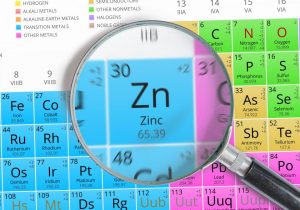16 March 2017 – Whenever new research is published, those of us with a special interest in autism check it out with equal parts of enthusiasm and caution. When the University of Auckland published new research in 2016, our national manager Catherine Trezona, asked Liliya John, one of our researchers, to investigate the findings. It seemed zinc might potentially safely support improved brain cell communication, and in the words of the new research ‘offer hope of new autism treatment.’
However, when Catherine shared the findings with Paula Jessop, member of our consumer reference group, Paula recommended caution in publishing the research report. In Issue 1 of the Altogether Autism Journal in 2017, we share both Liliya’s research report and Paula’s cautions, as we try to balance reporting potentially helpful research while guarding against making premature conclusions that might be harmful.
University of Auckland study on autism and zinc

Liliya John MSc, PG Diploma (Psych) is a researcher for Altogether Autism
A new study recently published indicates that zinc may impact autism. In this article, we outline the findings but emphasise that there is not yet sufficient evidence to be sure if zinc dietary supplements will affect autism. Further, taking too much zinc is toxic and supplements should not be given to children or taken by adults without medical advice, writes Liliya John.
A joint study led by neuroscientists in Auckland, America and Germany has shown cells that carry genetic changes associated with autism can respond to zinc and that zinc can boost the cell communication weakened by autism.
Their research is focused on a protein called SHANK3, which is associated with neuro-developmental conditions such as autism and schizophrenia. The study was published recently in the Journal of Neuroscience, and was funded by Marsden Fund and the neurological foundation (Johnston, 2016).
Auckland University’s lead investigator is Associate Professor Johanna Montgomery from the Department of Physiology and Centre for Brain Research.
Her research showed that gene changes in autism decrease brain cell communication (“Zinc found to reverse brain cell changes in autism,”2016). Many of the genes changed in autism involve proteins positioned at the synapse (the boundary region) between nerve cells. Earlier research by Montgomery and Craig Garner, Professor at the University of Stanford, had identified how autism-related changes to a group of proteins called SHANK proteins alter the structure and function of the synapse and that zinc could change the function of these proteins (Morton, 2013).
Background information on the autism and zinc connection
The recent interest in autism and zinc is based on studies indicating that zinc deficiencies may contribute to autism (Faeber, Zinn, Kern & Kingston, 2009). In 2014, Faender and Grabrucker found that more people with autism were lacking in zinc compared with neurotypical control group matched in terms of age. Research also showed that pregnant mothers with zinc deficiencies may increase the likelihood of autism in her children and might also lead to brain impairments later in life (Vela et al., 2015).
Zinc is an essential trace element found in humans and is capable of supporting normal growth and development across various stages of lifespan such as pregnancy, childhood, and adolescence. Zinc is also an important anti-oxidant and is involved in immune system functioning, wound healing, cell division, and senses such as taste and smell (Bjorklund, 2013). As one of the most prevalent metal ions in the brain, zinc has a key role in shaping cognitive development and maintaining healthy brain function through its involvement in various neuro-physiological processes such as the regulation of growth, development and movement of nerve cells, known as neurogenesis, neuronal migration, and differentiation (Vela, Stark, Socha, Sauer, Hagmeyer, & Grabrucker, 2015). Zinc deficiency in humans results in a variety of conditions including growth impairment (Cole & Lifshitz, 2008) and cognitive impairment (Prasad, 2013).

Zinc can boost the cell communication weakened by autism.
Zinc and cell communication
SHANK3 is a protein responsible for facilitating communication between neurons. Changes in the SHANK3 are one of the most common genetic changes associated with autism (Durand et al., 2006).
According to Montgomery, lead investigator of the study at the University of Auckland, current research shows that even where the SHANK3 gene is changed in people with autism, the gene is still responsive to zinc. The SHANK3 gene is capable of acting as a zinc sensor at the synapses, and also can enhance the communication between the brain cells. So even though the SHANK3 gene is changed, these changes do not take away zinc’s ability to strengthen and stabilise synapses (Johnston, 2016). Montgomery’s current research has shown that zinc can increase brain cell communication that was previously weakened by autism-associated changes in SHANK3 (Arons et al., 2016).
Is it safe to take zinc supplements?
The findings are promising as they offer the possibility that zinc may be considered for treating autism in the future. The researchers are now making further plans to investigate whether dietary zinc supplements can be used to improve brain cell communication resulting in improvement for the autistic person. Montgomery warns that too much zinc can be toxic and emphasises the need for determining the optimum levels of zinc that can be safely consumed. Future research aims to determine whether zinc is beneficial for all or a just for some autistic people (“Zinc offers hope of new autism treatment: Study”, 2016).
About the author
Liliya John MSc, PG Diploma (Psych) is a researcher for Altogether Autism.
This article was first published in Altogether Autism Journal Issue 1, 2017 read the latest edition.
References
Arons, M.H., Lee, K., Thynne, C.J., Kim, S.K., Schob, C., Kindler.,… Garner, C. (2016). Shank3 Is part of a Zinc-sensitive signalling system that regulates excitatory synaptic strength. The Journal of Neuroscience, 36(35), 9124-9134.
Bjorklund, G. (2013). The role of zinc and copper in autism spectrum disorders. Acta Neurobiolicale Experimentals, 73, 225–236
Cole, C.R., & Lifshitz, F. (2008). Zinc nutrition and growth retardation. Paediatric Endocrinology Reviews, 5(4), 889-96.
Durand, C.M., Bentacur, C., Boeckers, T.M., Bockmann,J., Chate, P., Fauchereau, F., … Bourgeon, T. ( 2006). Mutations in the gene encoding the synaptic scaffolding protein SHANK3 are associated with autism spectrum disorders. Nature Genetics, 39, 25 – 27.
Faber, S., Zinn, G.M., Kern, J.C., & Kingston, H. M.(2009). The plasma zinc/serum copper ratio as a biomarker in children with autism spectrum disorders. Biomarkers, 14 (3),171-80.
Faender, S.P., & Grabrucker, A.M. (2014). Characterization of biometal profiles in neurological disorders. Metallomics, 6(5), 960–977.
Johnston, M. (2016, August, 30). Zinc could help treat autism – study. The New Zealand Herald. Retrieved from http://m.nzherald.co.nz/nz/news/article.cfm?c_id=1&objectid=11701612
Morton, J. (2013, October 29). New projects to receive funding from Marsden Fund. The New Zealand Herald. Retrieved from http://m.nzherald.co.nz/politics/news/article.cfm?c_id=280&objectid=11148115
Prasad, A.S. (2013).Discovery of Human Zinc Deficiency: Its Impact on human health and disease. Advances in Nutrition, 4, 176-190.
Vela, G., Stark, P., Socha, M., Sauer, A., Hagmeyer, S., & Grabrucker. (2015). Zinc in gut-brain interaction in autism and neurological disorders. Neural Plasticity. doi: 10.1155/2015/972791
Zinc found to reverse brain cell changes in autism. (2016, August 31). Retrieved from https://www.auckland.ac.nz/en/about/news-events-and-notices/news/news-2016/08/zinc-found-to-reverse-brain-cell-changes-in-autism.html
Zinc offers hope of new autism treatment: Study. (2016, August 31). Asia Pacific Daily. Retrieved from http://en.apdnews.com/xin-hua/479233.html


